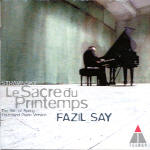Ever since Michael Tilson Thomas and Ralph Grierson made the first recording of Stravinsky’s four-hand reduction of The Rite of Spring in 1967 for EMI, a good number of piano duetists have taken up the work’s challenges on disc. This latest offering features Fazil Say, who shares the spotlight with himself via studio multitracking. Say essentially sticks to what Stravinsky wrote, while fleshing out the piano textures with effective octave doublings, registral changes, and an occasional added bass note in the Danse Sacrale. With overdubbing Say can include additional orchestral lines that four live hands cannot encompass, as well as bring in more pianos to reinforce climaxes. Some of the more congested passages result in skewed balances, for instance where the elaborate treble flourishes virtually eradicate the supportive bass clusters in the Introduction’s build-up. To my ears, Say’s “prepared piano” effects (muting the strings to achieve a more percussive sound) stick out like sore thumbs, and never quite mesh with their environment. Imagine hearing the glissando in the third-to-last bar scored for solo zither, and you’ll get a sense of how ridiculous it sounds when strummed across the piano’s strings.
When all is said and done the music’s savage subtext and kaleidoscopic rhythmic invention is tailor-made for Say’s unbridled, energetic virtuosity. He pushes ever so slightly–and thrillingly–as Part One’s concluding pages come down the home stretch, while pouncing on the offbeat accents in Glorification de l’Élue. At the same time, the pianist’s careful chord voicings in the Cercles Mysterieux des Adolescentes allow Stravinsky’s rich, dissonance-coated harmonies their full due. I only wish that Say had played the Round Dances in strict tempo rather than tinkering around with the rhythm and destroying the music’s granitic momentum in the process.
If you put the disc in your computer CD-ROM drive you can access a short video clip of Say playing snippets of the Stravinsky, plus a little Gershwin and Bach for good measure. It’s not something you’d want to watch more than once or twice, and it doesn’t compensate for the fact that this full-priced disc offers only 31 minutes of music. A strange, not wholly successful project, to say the least, but still worth a listen of you want Sacre alone on the piano.
































